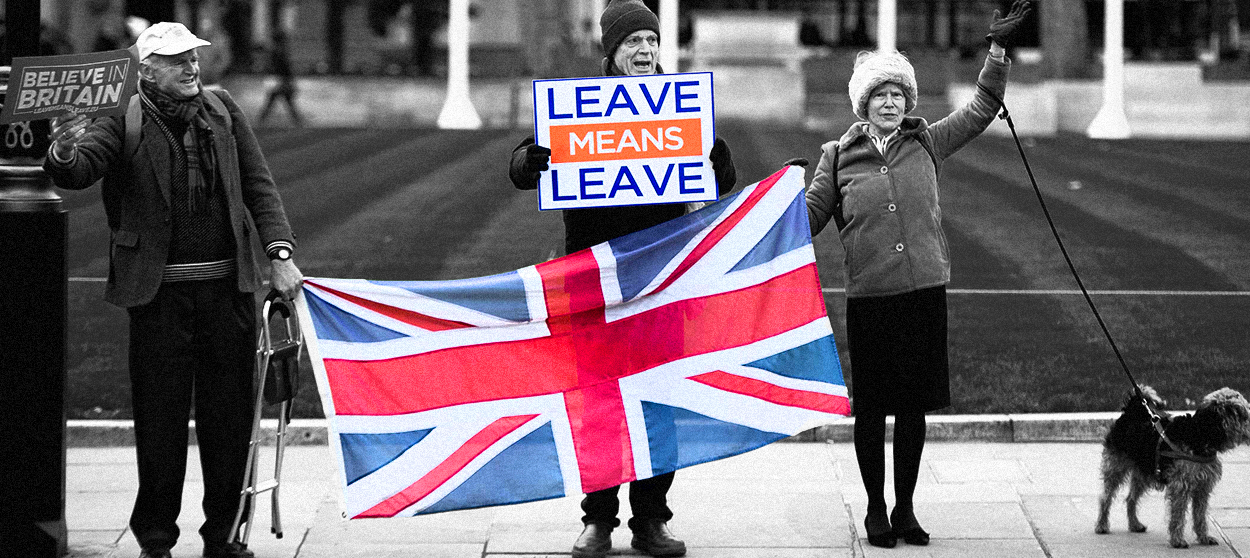Is this how Britain ends?
What the crushing defeat of Theresa May's Brexit deal reveals about the future of the United Kingdom


So Britain, which two years ago voted to leave the European Union, has now rejected the only deal on the table providing terms for that exit — and decisively so.
The outcome was largely fore-ordained, as the opposition parties had no reason to support the deal and the Conservative Party's partners, the Democratic Unionists of Northern Ireland, have stood foursquare against the deal because of its implications for the unity of the United Kingdom. The only question had been the margin, which we now know was a historic 432-202, the worst drubbing that any British government has ever received on an important measure.
Where Britain goes from here — back to Brussels in the hopes of extracting further concessions, or back to the people for a second referendum or new elections to Parliament — remains to be seen. But the rocks on which May's Brexit deal has foundered have revealed that the deeper question is whether Britain itself has a future.
The Week
Escape your echo chamber. Get the facts behind the news, plus analysis from multiple perspectives.

Sign up for The Week's Free Newsletters
From our morning news briefing to a weekly Good News Newsletter, get the best of The Week delivered directly to your inbox.
From our morning news briefing to a weekly Good News Newsletter, get the best of The Week delivered directly to your inbox.
The deal was rejected because it satisfied nobody. Those opposed to any exit from the EU were unhappy for obvious reasons. But those in favor of restoring British sovereignty were unsatisfied because the deal would have kept Britain tethered to the EU while a so-far elusive solution to the problem of Northern Ireland's border with the Irish Republic was resolved. That solution is likely to remain elusive now: It's impossible for Northern Ireland to have seamless relations with the Republic on matters of trade and migration without either making division between that nation and the rest of the U.K. or applying those same conditions to the U.K. as a whole. The circle cannot be squared.
That problem remains a problem, though, only inasmuch as the U.K. remains as committed to hanging on to Northern Ireland as Northern Ireland's Unionists remain committed to sticking with the U.K. And the U.K. is wobbling. When polled last year, two-thirds of Leave voters said they would chose a "hard border" in Ireland if that were the only way to get out of the EU, and fully 60 percent "would not mind either way" if Northern Ireland voted to leave the U.K. entirely. Nigel Farage isn't wrong that Brexit should be a very simple matter. It is — so long as you don't worry about holding the U.K. together after it's accomplished.
The vote for Brexit has been often described as a populist revolt by the countryside against the globalists in London — and it was that. But it was also a very distinctly English revolt. The victory margin for Leave in England and Wales was nearly double the margin in the U.K. as a whole — because Northern Ireland voted to Remain by a margin of nearly 56 percent to 44 percent, while Scotland voted a whopping 62 percent to 38 percent. And while Leave won every region of England but London, Remain won every single counting area in Scotland. If it was a nationalist reaction to globalism, it was English nationalism, not British.
If May's deal fails, her government falls, and Brexit is effectively canceled, all because of Northern Ireland, English nationalism could well become all the more truculent in the areas where it holds the greatest sway. But if Brexit does go through in some fashion, that will surely fan the flames of Scottish nationalism. Even though Scotland would have a far easier time leaving were Britain to remain in the EU (since leaving would then have minimal impact on trade between the two neighbors), the Scots already see Brexit as a blatant violation of a promise made by the Better Together campaign. If there is no second referendum on Brexit, there will likely be a second referendum on Scottish independence.
A free daily email with the biggest news stories of the day – and the best features from TheWeek.com
That's the thing about nationalism: It presumes a generally-agreed definition of the nation that is rarely agreed upon in practice. So Turkish nationalists must deny the reality of a Kurdish nation; Spanish nationalists provoke Catalan separatism; Ukrainian nationalists must pull away from Russia's embrace, and Russian nationalists must try to pull Ukraine asunder.
Understanding that doesn't make nationalist sentiment go away, because that sentiment springs from authentic sources. And managing that sentiment, the great challenge for liberal democracies today, requires a lot more than moral censure. But the nationalists themselves need to reckon with consequences that they rarely if ever acknowledge in their rhetoric — consequences for the integrity of the nation that they purport to revere.
The drama of Brexit has both revealed and deepened cleavages between the nations that make up the United Kingdom. They are unlikely to be knit up easily regardless of the outcome.
Noah Millman is a screenwriter and filmmaker, a political columnist and a critic. From 2012 through 2017 he was a senior editor and featured blogger at The American Conservative. His work has also appeared in The New York Times Book Review, Politico, USA Today, The New Republic, The Weekly Standard, Foreign Policy, Modern Age, First Things, and the Jewish Review of Books, among other publications. Noah lives in Brooklyn with his wife and son.
-
 7 bars with comforting cocktails and great hospitality
7 bars with comforting cocktails and great hospitalitythe week recommends Winter is a fine time for going out and drinking up
-
 7 recipes that meet you wherever you are during winter
7 recipes that meet you wherever you are during winterthe week recommends Low-key January and decadent holiday eating are all accounted for
-
 Nine best TV shows of the year
Nine best TV shows of the yearThe Week Recommends From Adolescence to Amandaland
-
 How Bulgaria’s government fell amid mass protests
How Bulgaria’s government fell amid mass protestsThe Explainer The country’s prime minister resigned as part of the fallout
-
 Femicide: Italy’s newest crime
Femicide: Italy’s newest crimeThe Explainer Landmark law to criminalise murder of a woman as an ‘act of hatred’ or ‘subjugation’ but critics say Italy is still deeply patriarchal
-
 Brazil’s Bolsonaro behind bars after appeals run out
Brazil’s Bolsonaro behind bars after appeals run outSpeed Read He will serve 27 years in prison
-
 Americans traveling abroad face renewed criticism in the Trump era
Americans traveling abroad face renewed criticism in the Trump eraThe Explainer Some of Trump’s behavior has Americans being questioned
-
 Nigeria confused by Trump invasion threat
Nigeria confused by Trump invasion threatSpeed Read Trump has claimed the country is persecuting Christians
-
 Sanae Takaichi: Japan’s Iron Lady set to be the country’s first woman prime minister
Sanae Takaichi: Japan’s Iron Lady set to be the country’s first woman prime ministerIn the Spotlight Takaichi is a member of Japan’s conservative, nationalist Liberal Democratic Party
-
 Russia is ‘helping China’ prepare for an invasion of Taiwan
Russia is ‘helping China’ prepare for an invasion of TaiwanIn the Spotlight Russia is reportedly allowing China access to military training
-
 Interpol arrests hundreds in Africa-wide sextortion crackdown
Interpol arrests hundreds in Africa-wide sextortion crackdownIN THE SPOTLIGHT A series of stings disrupts major cybercrime operations as law enforcement estimates millions in losses from schemes designed to prey on lonely users
